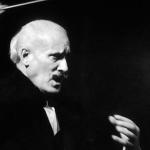Julian Young offers a neat summary of the Arthur Schopenhauer (the “first European Buddhist”) at the TLS.
Schopenhauer’s philosophy can be pinpointed by contrast with two better-known thinkers. Against Hegel’s fantastic “Bildungsroman, a story of the ever-increasing realization of ‘reason’ in human affairs,” Schopenhauer offered a thoroughgoing, relentless pessimism: “Progress, he held, is a delusion: life was, is, and always will be, suffering: ‘the ceaseless efforts to banish suffering achieve nothing but a change in its form.’ Far, then, from being the creation of a benevolent God, or of his surrogate, Hegelian ‘reason,’ the world is something that ‘ought not to exist.'”
Kant provided another interlocutor. In the first sentence of the first book of his World as Will and Representation, Schopenhauer wrote, “The World is my representation,” which he “intended as a summation of Kant’s ‘transcendental idealism’ according to which the world of space and time is not the ‘thing in itself’ but rather mere ‘appearance.'” Kant, he claimed, was too modest. We can get beneath the surface of things; philosophy can probe more deeply than common sense or science.
When we probe, we realize that the deeper level of the world, the noumena behind the phenomenal veil, is will. We are, he suggests, “aware of . . . the appearance of an apple followed by the appearance of a hand reaching towards it. Were this to be our only mode of consciousness, the connection between the first and second perception would be utterly mysterious. But of course it is not our only mode. The sequence of events is intelligible to us because inner experience reveals that the reason the second perception follows the first is the desire to eat.” Will generates actions. Will is the essence of existence.
Schopenhauer doesn’t think this is a happy conclusion. He’s a pessimist, remember. And he argues that life is suffering, in part precisely because life is will. Young summarizes two arguments that demonstrate the the world ought not be, the “competition argument” and the “stress-or-boredom argument.”
The will that dominates life is the will to live, and this seeks to satisfy itself, in a struggle against every other will, each of which is also seeking to satisfy itself. Reality is a flux of wills, a war of all against all. This is metaphysically true; it is also the essence of society, which is “an arena of competition. If one political party gains power another loses it, if one individual gains wealth another is cast into poverty. As the Romans knew, homo homini lupus, man is a wolf to man: ‘the chief source of the most serious evils affecting man is man.'”
If such is the world, the world ought not be.
Alternatively, we might satisfy all our wants. But that leads to the same pessimistic conclusion: “If . . . the will is satisfied then – after, at best, a moment of fleeting pleasure or joy – we are overcome by a ‘fearful emptiness and boredom.'”
We kill each other, or we die of boredom. Either way, the world ought not be.
Art gives us something of a reprieve from the demands of will: “in aesthetic consciousness we are, as we indeed say, ‘taken out of ourselves.'” But not for long: “the will can never be entirely silenced in the ‘life of a man.’ While the ascetic and the thinker may have some success in transferring themselves from the vita activa to the vita contemplativa, as long as one is alive one can never entirely escape the will. Only in death can the will be silenced ‘for ever.'”
The world ought not be. I ought not be. And the only salvation from such a world is the pacification of will that occurs in death.














